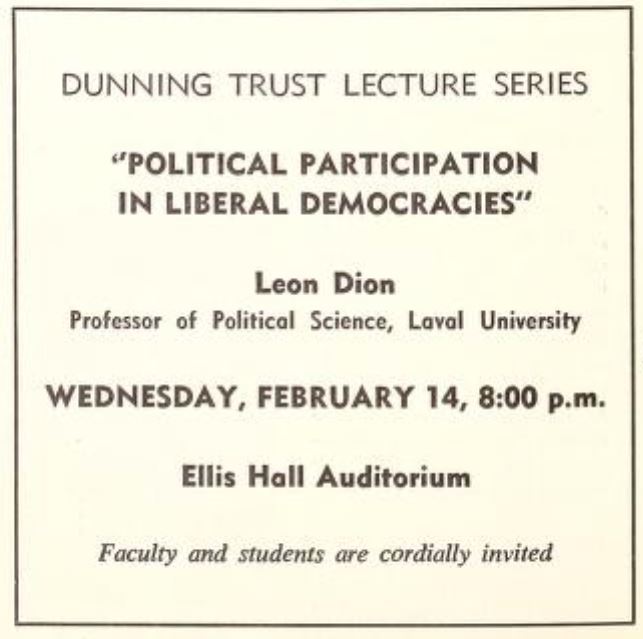
Leon Dion was Professor of Political Science at Laval University from 1948-1989. He was best known for studying educational reform and French-English relations. His book Le bill 60 et la société québécoise (1967) studied the Quebec education system during the Quiet Revolution. He also wrote the two-volume series Society and Politics: The Life of Groups as well as In Search of Quebec. Dion was an advisor to the Royal Commission on Bilingualism and Biculturalism, which led to the creation of the Official Languages Act. Over his career, he received numerous honours, including the French Academy Award, the Léon-Gérin Prize, the Esdras-Minville Prize, and was a member of the Royal Society of Canada, an Officer of the National Order of Quebec, and an Officer of the Order of Canada. In 1971, he was awarded an honorary doctorate of laws from Queen’s. He passed away in 1997.
In his lecture, Dion claimed that public participation in politics is as important to the health of a liberal democracy as representation is. There was a growing awareness of the need for serious adjustments in the forms and qualities of participation to account for the impact of industrialization, the welfare state, and mass culture. His talk outlined what would be required for a significant study of participation as a pillar of democracy, arguing that where participation is deficient, democracy was incapable of thriving. Dion took an expansive view of participation: in his view, it was not only voting, but also talking about politics with relatives and friends, campaigning for political parties and issues, lobbying involvement, work on advisory committees, etc. Participation, though was not equally available to all: only 10-15% of Canadians were active participants in political culture. However, once involved in one aspect of the democratic process, people are more likely to become involved in others. Canada needed to create a new conception of the relationship between individuals and society and between society and government, starting with a comprehensive study of the problem of participation. This was a crucial battle to fight, for Dion, to end indifference to inequality.
Dion’s lecture was on February 14, 1968.